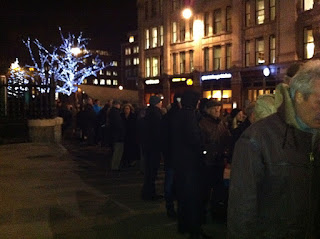I've recently come back from
Tampere in Finland, from a surprise trip arranged at the last minute due to a
family crisis. I won't go into what that was, but I ended up being in my
hometown for a week, visiting areas of the city which I just haven't had the
reason to go to for a long time. Each day of my visit I drove past my old primary
school, the woods where we cross country skied in the winter, and the area where
our family home was, before we moved to Stockholm.
During this time in Tampere
I also once again marveled at how the city has changed. The two main factories,
Finlayson and Tampella no longer produce cotton or machinery, instead the areas
have been developed into cultural centres and high quality residential areas.
Many old apartment blocks are receiving facelifts; even the train station now
has a set of escalators and some lifts. (I know, they've probably been there
for a years, but it was the first time I'd noticed them).
When I got back London,
after all was OK with family, I found myself thinking how I could arrange my
life so that I could live in Tampere. This, from the girl who swore she'd never
go back there, or who has for months now been considering applying for British
passport (I'm coming clean - I haven't done it yet!).
It helped that the weather
in Tampere was glorious. The sun was shining every day, transforming the colour
of the lakes into the brightest blue. Each way I looked there was water. One
morning I went for a jog and ran past beautiful houses, into the woods along
the shores of Lake Näsijärvi, and thought how wonderful it would be to be able to
do this every day. The place was so peaceful, so calm, yet it only took a few
minutes to reach the city centre by (a regular and not crowded) bus service. To
think that I’d be able to have a sauna every day, or that no-one would ask me
if I was in bad mood if I didn’t smile all the time!
When I came back to London,
on the first morning the tube was hot and packed. On my way home the very same
day, our local station was closed due to overcrowding, so I ended up, together
with hundreds (perhaps thousands?) of other people, taking the long way round,
adding an extra hour to my journey home. Why do I live in a sardine tin of a city
like London, I wondered, as I tried to keep my nose out of a particular smelly
armpit in another full-to-bursting tube carriage.
At the weekend I went to
Harris and Hoole in Crouch End for a coffee and the girl behind the desk asked,
after mishearing my name as Elena, if I was Italian. ‘No,’ I said, ‘Are you?’
‘Yes,’ the girl answered, adding with sad look in her eyes, ‘I’ve just come
back.’ I looked at her and replied, ‘I’ve just come back from my home town in Finland
and keep wondering what an earth I’m doing living in London.’ She laughed and
nodded.


























